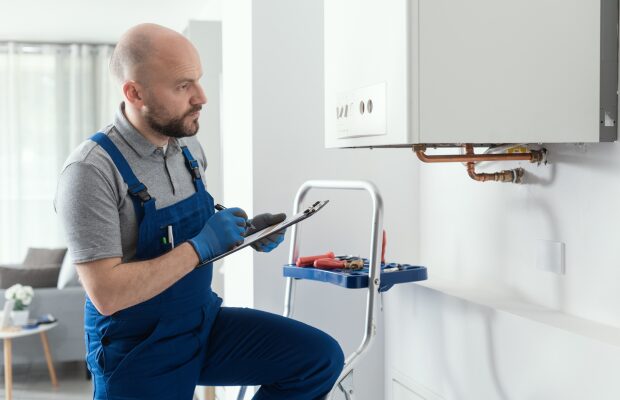It’s easy to see property development as a quick way to make big money.
But the reality of property development can be very different and it’s not a career that suits everyone.
In this guide, we’ll explore how you can become a property developer in more detail and reveal everything you’ll need to consider before deciding if it’s the career for you.
What is a property developer?
A property developer is someone who makes money either from buying, renovating, and then selling on property for a profit, or from building properties and selling them.
What does a property developer do?
Property developers come in two main forms:
- The flipper
- The land buyer
Property ‘flippers’ are those developers who buy rundown properties for a low price, renovate them and then sell them on for a profit.
Other property developers buy up land and then build one or more homes from scratch, before selling the property, or properties, on for a profit.
Can anyone become a property developer?
There are no specific qualifications to become a property developer.
But there are a key set of skills required to lower the risks involved.
To become a successful property developer, you’ll need to be:
- Good with money and budgets
- A hard worker
- A good communicator
- Business-minded and entrepreneurial
- Willing to take risks
- A good project manager
- Adaptable and calm
- A strong negotiator
How much do property developers make in the UK?
Successful property developers can become very wealthy through their work.
However, a renovation that runs over budget, a costly planning error or simply buying the wrong property can all have a huge impact on property developer profits.
How do I become a property developer?
If you’re certain property development is the right step for you to take, here’s what you’ll need to do to get started…
1. Start with the end in mind
It’s crucial to start out in property development with an end goal firmly in mind.
That means you should be fixed on what you’ll do with your first development property, and every property thereafter, before you buy it.
Will the property be renovated and sold, or rented out to tenants?
Does the profit lie in the resale value or in strong rental income and long-term capital growth?
2. Draw up a plan for your property business
A clear plan is vital for any new business, so you should draw one up that details:
- Where you’ll look for suitable properties or land
- How you’ll fund your purchases, renovations, or builds
- Your projected returns
- The contractors you’ll use or partner with
- How you’ll market your completed properties for sale or rent
- Your long-term plan and exit strategy
3. Understand your location and market
Research potential investment areas by looking at:
- The types of properties or land available to buy
- The price of properties and land in the area
- Demand for properties in the area
- The types of buyers (i.e. families, young professionals)
- Potential planning restrictions in the area
- Transport links and employment rates in the area
4. Look at funding options
Property investment requires cash and there are several potential funding options available:
- Mortgages
- Bridging loans
- Property development finance
If you’re planning to sell your development property once renovation work is completed, you may be able to fund your purchase using a traditional residential mortgage.
A bridging loan, meanwhile, could be an option to fund the renovation costs or purchase a property that a mortgage lender refuses to lend on.
These loans generally come with higher interest rates than mortgages, however.
Finally, development finance is a good option for funding renovations or build costs.
With development finance, a portion of build or renovation costs is released in advance before further incremental amounts are drawn down as the project progresses.
5. Buy, build and renovate like a professional
Your ability to buy, renovate or build the right properties for your target market are what will make or break your property development career.
By buying at the right price, you’ll be able to renovate effectively with a firm profit goal in mind. If you overspend on the purchase price, you’ll immediately be playing catch-up and may have to reduce your renovation budget to compensate.
With renovations, always keep your target market in mind, thinking about what they need and the space they’ll want to see in your property when it hits the open market.
Becoming a property developer: What you’ll need to consider
Becoming a property developer is a big decision and one that comes with a degree of risk. Before taking the plunge, you should consider the following…
1. Be aware of tax
Property development comes with several taxation considerations you’ll need to be aware of when you start, including:
- Stamp duty surcharges
- Capital gains tax liability
- Income tax liability
If you already own your own home and you’re buying a property to develop, you’ll have to pay an additional 3% stamp duty surcharge.
That means, from October 1, 2021, you’ll pay the following stamp duty rates on development properties:
|
Purchase price |
Stamp duty rate (inc surcharge) |
|
£0 – £125,000 |
3% |
|
£125,001 – £250,000 |
5% |
|
£250,001 – £925,000 |
8% |
|
£925,001 – £1.5m |
13% |
|
£1.5m + |
15% |
If the property you’re developing isn’t your main residence, you could be liable for capital gains tax when you sell it on.
Capital gains tax is calculated on the ‘gain’ you make – the difference between what you paid for the property and what you sold it for, minus your personal allowance and any allowable deductions.
If you decide to let your property to tenants, meanwhile, you may have to pay income tax on the money you make from rental income.
2. Consider the risks
Any investment comes with a degree of risk, so you’ll need to be aware of the market forces that could work against you, including:
- Rises in interest rates
- Changes to the economy and property market
- Development and planning restrictions in local areas
- Increases in building or labour costs
- The effects of weather on renovation work
- New regulations or legislation
3. Do you have the time?
Property development is an all-encompassing career and many people starting out don’t always appreciate the time it takes to get a project over the finish line.
If you’ll be project managing your developments yourself, it can mean long hours and lots of stress.
And if your investment location is away from where you live, you could be facing time away from your family while you manage your projects.
4. Planning permission
One of the most costly and stressful aspects of any property development project is planning permission.
Get it wrong, and you could end up with a property you can’t develop.
Always enquire about planning permission with the local authority as soon as you find a property you’re keen on.
Tell them about your plans and find out if there are any restrictions in place before you commit.
5. Hiring the right people
Time is money in property development and finishing projects on time and on budget is key to generating a healthy profit.
Hiring the wrong contractors or project managers can mean your project takes longer and you pay more for things like bridging finance.
Spend time researching your area’s best contractors and then meet with them to discuss your plans.
Be clear with what you’re looking to achieve and build a relationship with your chosen tradespeople.
This will stand you in good stead for future projects, where you’ll have trusted contractors you can call upon.







